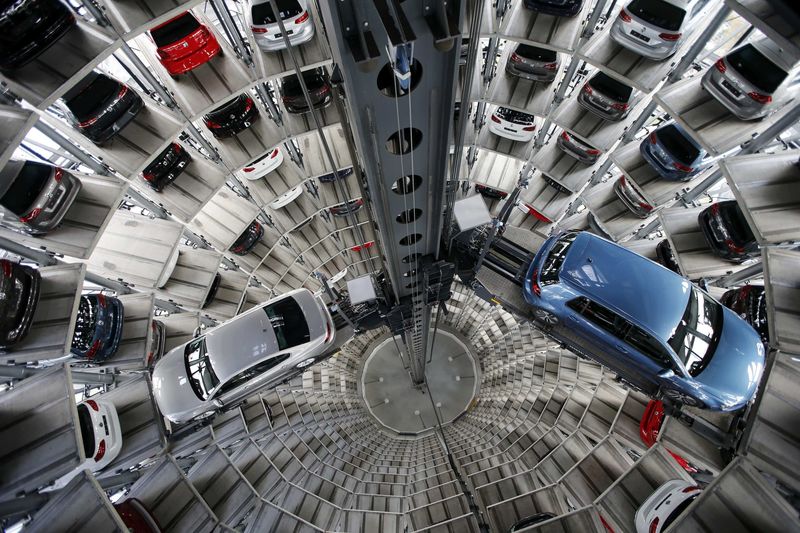By Nora Eckert
CHATTANOOGA, Tenn. (Reuters) – Early voting on a key union vote at Volkswagen’s (ETR:) plant in Tennessee showed most workers in favor of joining the United Auto Workers union.
A victory would make the Chattanooga plant the first auto plant in the South to unionize through elections since the 1940s, and the first foreign-owned auto plant in the South to do so.
It would also be a huge boost to UAW President Shawn Fain’s campaign to unify factories owned by more than a dozen U.S. automakers, including Tesla (NASDAQ:). Fain and his team have committed to devoting $40 million to this effort through 2026.
Federal officials from the National Labor Relations Board conduct the official count. The UAW, which has representatives in the room where the counting is taking place, said the ballots counted so far were 1300-399 in favor of the union. There are approximately 4,300 voting employees at the plant.
Dozens of VW workers, wearing red T-shirts emblazoned with “Future UAW Member,” cheered as the votes came in at a watch party.
Final results are expected around 11pm EDT (3am GMT Saturday).
“Everyone is watching,” said Isaac Meadows, a VW plant worker who said he voted for the union. “This is going to change the employment landscape across the country.”
Although the UAW narrowly lost votes at the same plant in 2014 and 2019, this year’s vote was preceded by rising public support for unions and successful contract negotiations last year with the Big Three automakers.
The UAW has said it will initiate votes once 70% of eligible workers at a plant sign cards supporting unionization.
While the UAW’s success is widely expected to strengthen union momentum in other factories, anti-union sentiment is deeply entrenched in many parts of the southern US. Earlier this week, Republican governors in six Southern states, including Tennessee, spoke out against the union initiative.
“We are going through an unusual, even unprecedented period when it comes to unions in general, and VW is at the epicenter of that right now,” said Harley Shaiken, a labor professor at the University of California, Berkeley.
In recent months, a group of volunteers at the plant, which produces the electric ID.4 SUV and other vehicles, have organized rallies to rally support, with occasional guidance and assistance from Detroit’s UAW officials.
Some workers at the plant have countered that joining the UAW could weaken workers’ job security in the future.
Workers on both sides agree that the plant campus was quiet as the vote took place, unlike in previous years when dozens of union supporters and opponents — both employees and members of the broader community — lined the driveway.
Friday afternoon, workers at the plant said those supporting the union wore red T-shirts that read “Stand Up, UAW,” while those opposed wore white T-shirts that read “Still No UAW,” but both parties removed the shirts before entering the factory due to company rules. The workers said people at the factory are excited and nervous as the voting comes to an end.
In a twelve-page pamphlet prepared by the UAW, the union laid out its arguments for how workers would benefit.
“Volkswagen has made $75 billion in profits over the past three years,” Fain said in the ceremony. “They can afford to pay you your fair share of wages, benefits and union protections.”
“How do I know? Because every Volkswagen auto worker in the world is a union member… except here in Chattanooga,” he added.
VW has said it has taken a neutral position on the vote at its only non-union factory in the world. The UAW has previously represented VW workers at a Pennsylvania plant that built Rabbit cars before it closed in 1988.
For decades, the union has been cracking down on southern auto factories. In addition to two small losses at VW earlier, the company suffered three more significant losses at southern Nissan (OTC:) plants, the last in 2017 in Mississippi.
The wider labor movement has since undergone something of a renaissance, with record numbers of workers from various sectors going on strike last year.

Last fall, U.S. President Joe Biden walked picket lines outside Detroit, where the union recorded double-digit percentage increases, as well as cost-of-living increases for General Motors (NYSE:), Ford Motor (NYSE:) and Stellantis (NYSE:). . That led to a wave of wage hikes by non-union automakers, which some analysts said were aimed at keeping unions out.
A Mercedes plant in Alabama, where a majority of workers have signed cards indicating they support unionization, will be the next site to host UAW elections, the week of May 13.


